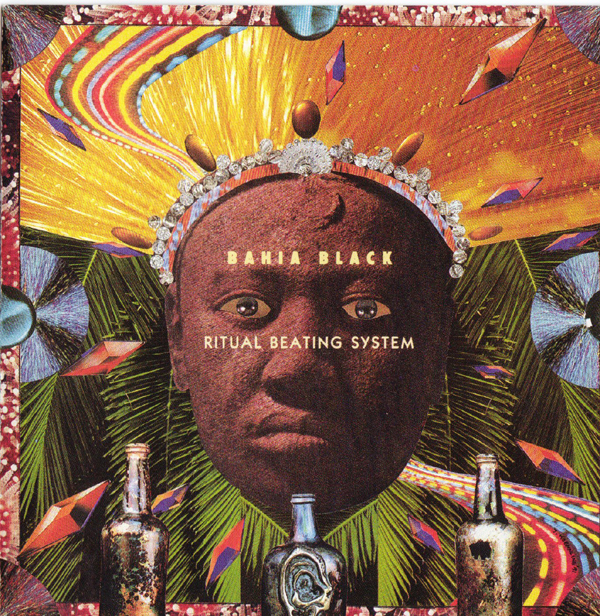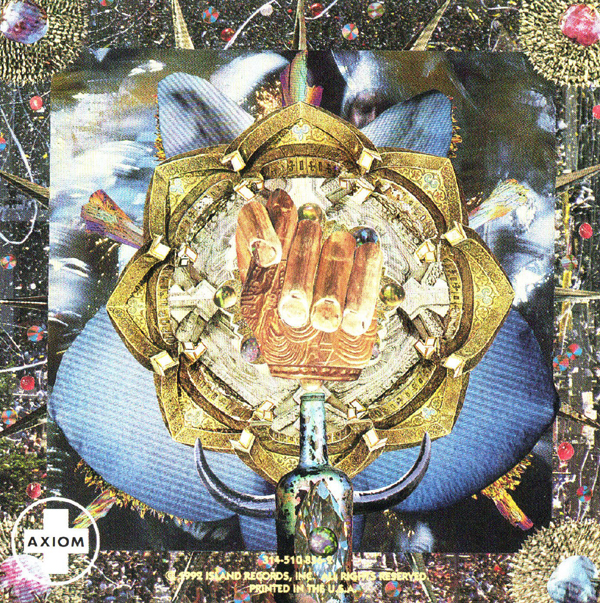BAHIA BLACK




1/ Retrato Calado (Brown) 2.02
2/ Capitao Do Asfalto (Brown) 5.05
3/ The Seven Powers (Hancock,Shorter,Olodum) 7.04
4/ Uma Viagem Del Baldes De Larry Wright (Brown,Wright) 3.30
5/ Olodum (Olodum) 3.26
6/ Guia Pro Congal (Brown) 5.20
7/ Gwagwa O De (Hancock,Shorter,Olodum) 8.08
8/ Follow Me (Walls) 4.22
9/ Nina In the Womb of the Forest (Brown) 2.26
Recorded at Sorcerer Sound, New York City and Greenpoint Studio, Brooklyn,
New York
Engineers at Sorcerer Sound: Jason Corsaro and Oz Fritz
Engineer at Greenpoint: Oz Fritz
Assistant: Imad Mansour
Mixed by Oz Fritz
Produced by Bill Laswell
Mastered at Masterdisc, NYC by Howie Weinberg
Carlinhos Brown: guitar, percussion, vocals; Wayne Shorter: soprano
saxophone; Herbie Hancock: piano, prepared piano; Bernie Worrell: Hammond
B-3 organ; Henry Threadgill: flute; Larry Wright & David Chapman: buckets;
Tony "Funky Drummer" Walls: drums, metal; OLODUM - Antonio Luis Alves de
Souza: leader; Bartolomeu P. Nunes, Luiz C.S. Alves, Jose de Souza, Antonio
Carlos S. Brito, Jose Carlos Dos Santos, Gilmario M. de Andrade, Luis C. Moreira,
Edilson Da Silva Neiva & Luis C.M. Monteiro: ensemble.
1992 - Axiom/Island (USA), 314-510-856-1 (Vinyl)
1992 - Axiom/Island (USA), 314-510-856-2 (CD)
2016 - Bill Laswell Bandcamp (digital)
Note: Bill Laswell does not play on this album.
Politics : 4 stars
Entertainment : 4 stars
Chris Brazier (courtesy of the One World website)
Mention Brazilian jazz and my head collapses at the thought of audiophile labels purveying sonically correct sambas stripped of spirit. But this tough fissionable material produced by Bill Laswell is something else again, a natural bridge between pit-of-the-stomach rhythms from the favelas and pit-and-the-pendulum North American angst meeting at the shared midpoint of the mess of days to come. Surprising, then, how lyrically these fin de siecle blues state our sinking fates, how eloquently a kit of buckets responds to a bateria, and how rare when a roster of big names (Herbie Hancock, Bernie Worrell, Wayne Shorter) plays sympatico music without showboating.
Bob Tart (courtesy of the The Beat magazine website) )
This record is a MONSTER. I don't think I've ever said that about a recording before, but it is the first word that came into my mind as I listened. After too many trite, boring or just adequate attempts to start the next Brazilian wave, who else but Bill Laswell and company comes on the scene with a blueprint for fusion. Brazilian music has always had an experimental edge, from Veloso to Nascimento, Byrne to Simon. What this most harkens to is the weird edginess of Tom Zé or Hermeto Pascoal. Bop, blues, jazz and funk have all been boiled down in a Bahian vat of smooth vocals and brutal drumbeats. The cast alone is recommendation, and I can't leave out one: the smooth voice of Carlinhos Brown, the pulse of Olodum, the metallic beats supplied by Larry Wright and David Chapman, the kit drums by Tony Walls. Melody and chords come from the ever so funkadelic keys of Bernie Worrell and Herbie Hancock, and an outside tune is blown by Henry Threadgill and Wayne Shorter. This is a drummers paradise, and they are not relegated to mere coloration. They are the whole point, in fact, and even the other instruments begin to take on the percussion aspects throughout. Great credit goes to producer Laswell for finally finding a dynamic slot for the throbbing rhythms of Bahian drum ensemble Olodum, a group that was poorly utilized on Paul Simon's excursion south. What to play? The street samba of "Guia Pro Congal," the incredible power of the Shorter/Hancock/Olodum compositions "The Seven Powers" and "Gwagwa O De." Oh, hell, play every damn cut on the album. For a change I haven't a nit to pick or a complaint to make.
CF (courtesy of the Roots World website)
Producer Bill Laswell never knows when to leave well enough alone: confronted with an excess of talent, he tried to cram everything onto one album, and came up with a confused mess. Brown's the main writer and performer, and his "Capitão Do Asfalto" is a characteristically offbeat mix of angry spoken vocals and heavy percussion with atmospheric acoustic guitar and flute. But he's fighting for album space with Laswell cronies like Henry Threadgill and Tony "Funky Drummer" Walls (who contributed the lame bash-o-rama "Follow Me"). I'll grant, though, that Brown's percussion duet with teenage NYC street musician Larry Wright (on plastic buckets) is a blast ("Uma Viagem Del Baldes De Larry Wright"). Bernie Worrell adds organ (prominent on the gentle, percussion-free opener "Retrato Calado"). The record also includes two tracks written and performed by Herbie Hancock, Wayne Shorter and Brazilian percussion ensemble Olodum ("The Seven Powers," "Gwagwa O De") - in both cases, Olodum lays down its usual polyrhythmic beat while the jazz players noodle (Hancock more successfully). Olodum's own self-titled feature is even duller - no melody instruments or vocals, just slight variations on a basic pulse.
2 stars out of 5
David Bertrand Wilson (courtesy of the Wilson and Alroy's Record Reviews website)
A frustrating and ultimately disappointing listen that’s not without its points of interest, Ritual Beating System focuses on two Brazilian star groups out of Bahia, guitarist, percussionist and vocalist Carlinhos Brown and the ten-piece drummer unit Olodum, under the collective rubric of Bahia Black. Relentless percussion is difficult to appreciate, particularly when it’s prolonged like it is here or presented as a musical statement without any sort of visual accompaniment at all. After a while, it just gets boring. That is probably why Brown and Olodum are given plenty of support here by such Americans as Bernie Worrell on organ (“Retrarato Calado,” “Capitão do Asfalto” and “Guia Pro Congal”), Herbie Hancock on piano and Wayne Shorter on soprano sax (on the two seemingly spur-of-the-moment pieces “The Seven Powers” and “Gwagwa O De”), Henry Threadgill (“Capitão do Asfalto” and “Guia Pro Congal”) and several percussionists including Tony “Funky Drummer” Walls, whose only other credit seems to be LL Cool J’s Walking With A Panther. Bill Laswell functions only as producer (and probably conceptualist) here and the lack of his bass – or any bass at all – contributes to the music’s overall lack of focus. The album also sounds divided into the melodic and interesting Carlinhos Brown pieces and the meandering, often meaningless Olodum songs. Bernie Worrell’s organ, on the other hand, sounds wondrous and positively electric in contrast to Brown’s commanding vocals and acoustic guitar accompaniment. While he’s only audible on three songs here and is never terribly prominent, Worrell’s presence is always felt, providing a strong foundation and fills that really elevate Brown’s remarkably interesting music. Whatever its faults, Ritual Beating System suggests that a greater exploration of “Bernie Worrell In Brazil” is in order. “Retrarato Calado,” “Capitão do Asfalto” and “Guia Pro Congal” hint wonderfully in that direction.
Doug Payne (courtesy of the Sound Insights website)